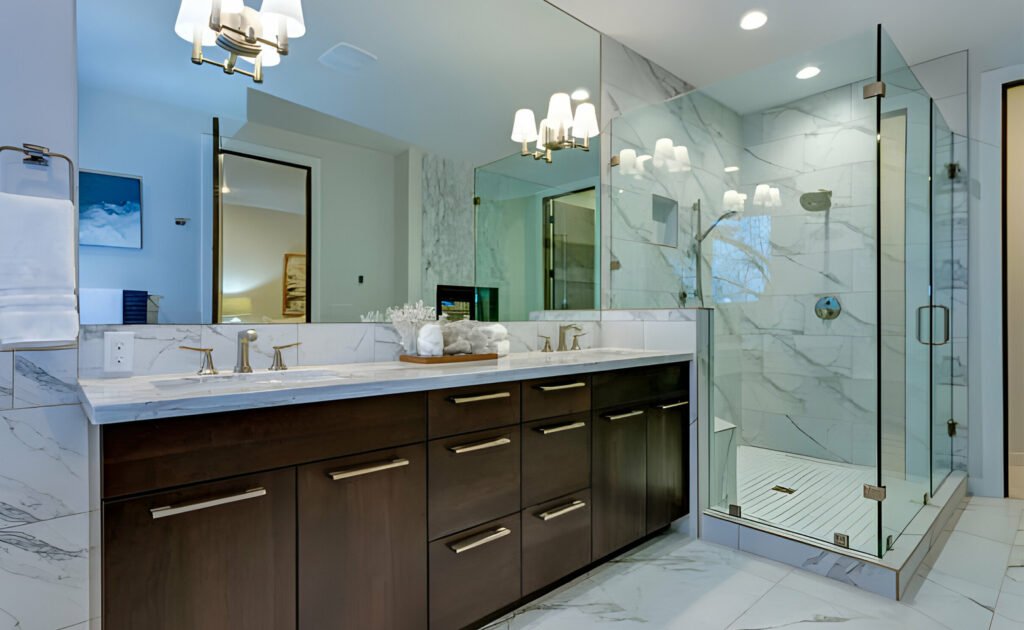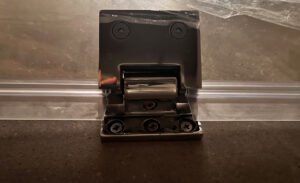In the realm of modern bathroom design, frameless shower doors stand out for their sleek, minimalistic aesthetic and the way they can make a bathroom appear more spacious and luxurious. However, the beauty and functionality of these doors hinge significantly on the choice and quality of hardware used. From hinges and handles to seals and stabilizing bars, every component plays a crucial role in ensuring the durability, safety, and overall performance of frameless shower doors. This article delves into the various hardware solutions available for frameless shower doors, offering insights to homeowners and designers aiming to achieve both aesthetic appeal and functionality in their bathroom designs.
Frameless shower doors are a popular choice for those looking to add a touch of elegance and openness to their bathrooms. Unlike their framed counterparts, frameless doors rely on sturdy, high-quality hardware for their structure and stability. This makes selecting the right hardware not just a matter of design, but also of safety and longevity.
Types of Hardware for Frameless Shower Doors
High Quality Shower Glass Hinges
The backbone of any frameless shower door, hinges bear the weight of the glass, allowing it to open and close smoothly. Solid brass with a corrosion-resistant finish is often recommended for its durability and longevity. There are mainly two types of hinges used: pivot hinges, which allow the door to swing both in and out, and wall-mount hinges, which are affixed to one side.
Shower Glass Handles and Knobs
Handles and knobs not only need to complement the door’s aesthetic but also provide a comfortable and secure grip. They come in various styles, including bar pulls, knobs, and towel bar combos, and are made from materials like stainless steel, brushed nickel, and chrome to match any bathroom decor.
Shower Glass Seals and Sweeps
To prevent water leakage, frameless shower doors require proper sealing around their edges. Transparent polycarbonate seals and sweeps are designed to fit the door’s bottom and sides, effectively keeping water within the shower area without detracting from the door’s frameless appearance.
Clamps and Brackets
Glass clamps and brackets secure the panels in place, ensuring stability without compromising the door’s frameless look. They must be strong enough to support the glass weight and are typically made from the same corrosion-resistant materials as hinges.
Shower Glass U-Channels
U-channels offer an alternative method for securing glass panels to the walls or floor. Made from aluminum or stainless steel, they provide a sleek way to install frameless doors while minimizing the use of visible hardware.
Stabilizing Bars
Glass clamps and brackets secure the panels in place, ensuring stability without compromising the door’s frameless look. They must be strong enough to support the glass weight and are typically made from the same corrosion-resistant materials as hinges.
Choosing the Right Hardware
Selecting the right hardware for your frameless shower door involves considering both form and function. It’s crucial to:
- Ensure compatibility with the glass thickness and weight.
- Match the finish and style with the bathroom’s overall design.
- Opt for high-quality materials that offer durability and corrosion resistance.
- Consult with professionals for proper installation to ensure safety and functionality.
Maintenance and Care
Proper maintenance can significantly extend the life of your frameless shower door hardware. Regular cleaning with mild soap and water, avoiding harsh chemicals, and periodic checks for any signs of wear or damage can help maintain the hardware’s appearance and functionality.
FAQ
What is the best material for frameless shower door hardware?
The best materials for frameless shower door hardware are those that offer durability, corrosion resistance, and aesthetic appeal. Solid brass, stainless steel, and anodized aluminum are top choices due to their strength and resistance to moisture and corrosion.
How do I choose the right hardware for my frameless shower door?
When choosing hardware for your frameless shower door, consider the glass thickness and weight, the overall design and finish of your bathroom, and the durability of the materials. Consulting with a professional can also help ensure that you select the most suitable hardware for your specific installation.
Can I install frameless shower door hardware myself?
While it’s possible for DIY enthusiasts with the right tools and knowledge to install frameless shower door hardware, it’s generally recommended to have it installed by professionals. Proper installation is crucial for safety and performance, and professionals can ensure that the hardware is correctly installed and adjusted.
How do I maintain my frameless shower door hardware?
Maintain your frameless shower door hardware by regularly cleaning it with mild soap and water. Avoid using harsh chemicals or abrasive materials that can damage the finish. Check the hardware periodically for signs of wear or damage, and tighten any loose components as needed.
How often should I replace the seals and sweeps on my frameless shower door?
The frequency at which you should replace the seals and sweeps on your frameless shower door depends on their condition and how often the shower is used. Generally, it's a good idea to inspect them every six months and consider replacing them if you notice signs of wear, such as cracking or discoloration, to ensure the best water containment.
What is the difference between pivot hinges and wall-mount hinges?
Pivot hinges allow the shower door to swing both in and out, offering flexibility in door movement. Wall-mount hinges, on the other hand, are fixed to one side of the door and the wall, allowing the door to swing in one direction only. The choice between the two hinges depends on your space requirements and personal preference.
Can frameless shower doors accommodate uneven walls or floors?
Frameless shower doors can accommodate uneven walls or floors with the use of adjustable or custom-made hardware, such as hinges with adjustable angles or U-channels that can be tailored to fit the specific angles of your bathroom. It's essential to address these issues during the planning and installation process to ensure a secure and functional installation.
Are there any special considerations for the hardware of large or heavy frameless shower doors?
For larger or heavier frameless shower doors, it's important to select hardware that can support the additional weight. This may include using heavier-duty hinges, additional stabilizing bars, or larger clamps and brackets. Ensuring the hardware is suitable for the door's size and weight is critical for safety and functionality.



